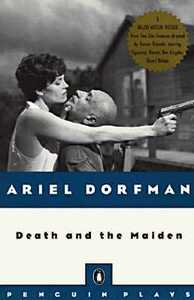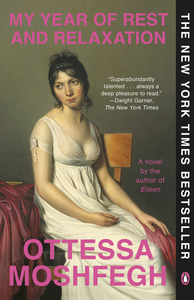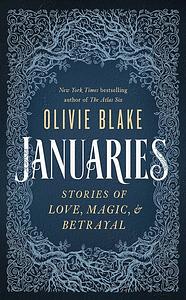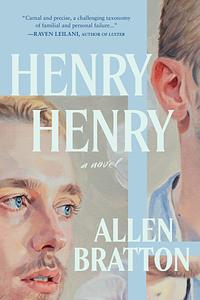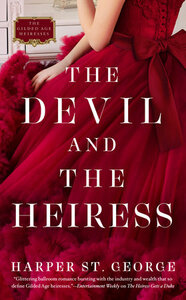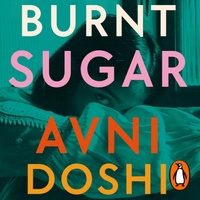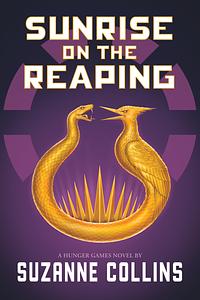You need to sign in or sign up before continuing.
Take a photo of a barcode or cover
divineauthor's Reviews (402)
“[Whiteness is] the position of no position, the voice from nowhere or from everywhere, and in this it is Godlike.”
—page 33, “Writing Like a White Guy”
bolina doesn’t say anything particularly new in my eyes, but that doesn’t mean his voice isn’t worth something. strength in numbers, obviously. it’s always interesting to read essays from us-born children of immigrants, how they navigated their way through the whiteness of the world. bolina’s prose is strong—i would’ve been able to tell he was a poet before he said so. quick read, would recommend. alright, love n light, guys!
challenging
dark
tense
How can you tell the truth if the mask you have adopted ends up being identical to your face? How does memory beguile and save and guide us? How can we keep our innocence once we have tasted evil?
—Ariel Dorfman, “Afterword,” page 75
it doesn’t take long for the action of this play to become fucking electric, guys. dorfman’s DEATH AND THE MAIDEN microscopically uses one couple’s night as a synecdoche of the issues of an ambiguous latin american country’s new democratic government (an overt nod to post-pinochet chilean dictatorship). this three-person play oscillates between madness and rationality, justice and injustice, violence and peace—sometimes even a lukewarm neutrality, thank you gerardo. within about sixty pages, dorfman deconstructs and reconstructs the arc of patriarchy and the minute rise of matriarchy within a single scene, sometimes a single breath; he doesn’t nudge the audience, rather, he bodily pulls them into asking themselves these questions: how do you live with others who have done harm? how do you find peace after so much war? how do bad deeds go punished—should they? would they ever?
utterly fascinating play. it makes you question your own ethics, look inward. ugh. crazy, crazy work. still very relevant actually.
anyway, love n light, guys.
dark
funny
Oh, sleep. Nothing else could ever bring me such pleasure, such freedom, the power to feel and move and think and imagine, safe from the miseries of my waking consciousness.
—page 46
MY YEAR OF REST AND RELAXATION is quintessentially moshfeghian: caustic narrator, gritty prose, and some of the most bizarre, haze-inducing stories on the current market. her narrators are rarely likeable, but to me they’re compelling because moshfegh loves to hold up a mirror to humanity’s dark underbelly. and for this novel, she went for the thinspo glitz-and-glam of the WASP-y new yorker. what else do you expect from a woman who wants to sleep away her problems, who truly doesn’t care about the suffering of people around her or her own, a woman who drowns her cares with another ambien or five?
this isn’t my favorite moshfegh novel, but i “enjoyed” it all the same. the only note i’ll make is that unlike her other works where the ending slowly unveils itself to me over the course of the narrative, the setting immediately clued me in, so i wasn’t surprised, per se, but it was wrapped well for Me. okay, that’s all i got. love n light everyone
“I think most people are better at it than me.”
“Better at what?”
“All of it,” I said. But what I meant was existing.
—page 373, in “A Year In January”
par for the course of my experience reading olivie blake, JANUARIES is a microcosm of her writing as a whole which means: there are really fucking good stories, fun ones, mediocre ones, and boring ones.
i adored “The Wish Bridge,” “Sucker for Pain,” “The Animation Games,” and “To Make a Man.” i just have fun with fucked up or weird power dynamics, and, of course, love and devotion. her experimental ones like “Monsterlove” was quite interesting from a craft perspective, but some of the other stories—especially in the autumn section—fell flat for me. it’s probably a combination of the piece itself and the audiobook narrators (not a fan of a couple of them). anyway, love n light, guys!
challenging
dark
emotional
“Maybe I’m just my father, and he’s just his father, and on and on, all the way back to Adam, so no one has ever really died, and no one has ever really lived.” —Hal Lancaster, page 266
i must admit, i’m not well-versed in shakespeare’s HENRIAD, so the modern retelling of it all eludes me, but it did make me slightly more inclined to read some of the plays, so maybe this is a win for bratton.
okay, so in the most normal way i can put this without sounding like an absolute freak, the on-page incest between hal and his father, henry, isn’t . . . as bad as i expected? it’s vile and immoral, yes, but the way bratton writes makes all their actions so inert which is so interesting because most of this book is a close third person pov on hal, and to be so distanced from him even when he’s being violated shows such a great sense of dissociation. a removal of oneself because, to hal, there is no self. there is a mirror, a reflection. a father, a father’s father, and so on. and, you know, bratton’s prose is actually one of the most fascinating parts of the novel to me. there’s this moshfegh-esque flagrancy to the diction: sensory experiences heightened to the point of past bearing.
anyway, i do think people should read more things that challenge them in ways that goes against their bounds of comfort. read this, or don’t! i wouldn’t say i “enjoyed” this novel, but i was moved by it. all right, love and light, guys!
emotional
fast-paced
“I miss you constantly […] I love you constantly.” —Lord Leigh, page 267
so this was a major disappointment. this is my first st. george novel, and i hate to say that i probably won’t read any more of her books unless it really calls to me.
violet and christian’s romance . . . is lackluster. their first kiss didn’t move me, neither did many of their intimate scenes. on a sentence-level, st. george is capable of writing decently, but there’s no sauce to her characters which means there’s no sauce to the whole book. i hated how christian wasn’t a true “devil” to violet’s “heiress” because it’d make violet feeling betrayed at least more believable! boo hoo, all your feelings are hurt—girl, you’re nineteen and he’s in his late twenties. be real right now. yeah, historical romance, etc etc . . . it is off-putting how much emphasis there was on their age gap. like can we be fucking serious here. anyway. boring as fuck. don’t recommend unless you want to claw your eyes out. love n light, guys!
so this was a major disappointment. this is my first st. george novel, and i hate to say that i probably won’t read any more of her books unless it really calls to me.
violet and christian’s romance . . . is lackluster. their first kiss didn’t move me, neither did many of their intimate scenes. on a sentence-level, st. george is capable of writing decently, but there’s no sauce to her characters which means there’s no sauce to the whole book. i hated how christian wasn’t a true “devil” to violet’s “heiress” because it’d make violet feeling betrayed at least more believable! boo hoo, all your feelings are hurt—girl, you’re nineteen and he’s in his late twenties. be real right now. yeah, historical romance, etc etc . . . it is off-putting how much emphasis there was on their age gap. like can we be fucking serious here. anyway. boring as fuck. don’t recommend unless you want to claw your eyes out. love n light, guys!
reflective
TOM: […] time is the longest distance between two places.
being a memory play, the wingfield family’s life teeters between reality and dreams. there’s a tenderness to the way tom, the narrator, brings the audience back to these moments, these memories. amanda, the former southern belle, tries to look at the future for her children, but there’s always a part of her, the alive part of her, that remains in the past: her beautiful dresses, her gentlemen callers, her deadbeat husband. with tom, he’s always wants more than the warehouse job he’s working at. he’s a poet at heart—a dreamer by nature, really. and laura . . . she is not of this world at all. she’s a blue rose, a glass figurine. she’s much too internal to ever get out of herself, let alone her room with her pretty, fragile things.
i was so charmed by this play, y’all. it’s a tragedy, but of a lighter kind. there are no villains here, not really. there’s only a cold reality, as bracing as an oncoming storm.
being a memory play, the wingfield family’s life teeters between reality and dreams. there’s a tenderness to the way tom, the narrator, brings the audience back to these moments, these memories. amanda, the former southern belle, tries to look at the future for her children, but there’s always a part of her, the alive part of her, that remains in the past: her beautiful dresses, her gentlemen callers, her deadbeat husband. with tom, he’s always wants more than the warehouse job he’s working at. he’s a poet at heart—a dreamer by nature, really. and laura . . . she is not of this world at all. she’s a blue rose, a glass figurine. she’s much too internal to ever get out of herself, let alone her room with her pretty, fragile things.
i was so charmed by this play, y’all. it’s a tragedy, but of a lighter kind. there are no villains here, not really. there’s only a cold reality, as bracing as an oncoming storm.
emotional
mysterious
medium-paced
“Her joy had unsettled him: It was a flame, a dangerous flame that he feared would burn him if he were foolish enough to embrace it. He had not known until this moment how beautiful he thought it. How much he cherished it.” —Lord Vere
this reread was such good fun!!! yet again, i will always always always love media that plays with identity and performance, and picking this up again was so yummy because i forgot the minutiae of it and it was like experiencing all the mystery again. this time around, i appreciated freddie’s b-plot a little more, and just vere and freddie’s relationship in general (brothers . . . wailing) which i know in my balls i did not enjoy as much during my first read through because i was focused on ellisande and vere fr. all right, guys, love n light.
══════════════════
02/06/23: oh my god. oh my god ? HELLO ‼️ u know after reading like 3 sherry thomas histroms i thought i was in for your standard romance but i was WRONG and i’m HAPPY ABOUT IT!!! this book focuses less on the romance than her other ones and more on the plot (which is a delicious spy mystery) and i ate that shit up! one thing about me is that i will gobble up any and every secret identity trope and this had it in SPADES. like vere acting the idiot despite his deep intelligence in service to justice or elissande acting the perfect, happy woman while hiding her deep despair . . . DELICIOUS. other people may not like this because it does focus more on the plot than the characters but it was fun for Me!
this reread was such good fun!!! yet again, i will always always always love media that plays with identity and performance, and picking this up again was so yummy because i forgot the minutiae of it and it was like experiencing all the mystery again. this time around, i appreciated freddie’s b-plot a little more, and just vere and freddie’s relationship in general (brothers . . . wailing) which i know in my balls i did not enjoy as much during my first read through because i was focused on ellisande and vere fr. all right, guys, love n light.
══════════════════
02/06/23: oh my god. oh my god ? HELLO ‼️ u know after reading like 3 sherry thomas histroms i thought i was in for your standard romance but i was WRONG and i’m HAPPY ABOUT IT!!! this book focuses less on the romance than her other ones and more on the plot (which is a delicious spy mystery) and i ate that shit up! one thing about me is that i will gobble up any and every secret identity trope and this had it in SPADES. like vere acting the idiot despite his deep intelligence in service to justice or elissande acting the perfect, happy woman while hiding her deep despair . . . DELICIOUS. other people may not like this because it does focus more on the plot than the characters but it was fun for Me!
emotional
reflective
medium-paced
“I wish she would die, at least for a little while, and then come back in any form I saw fit. Maybe a dog who would follow me around. Even as these thoughts enter my head, I can’t believe I am thinking them. I love her, my mother. I love her to death. I don’t know where I would be without her. I don’t know who I would be.” —Antara, page 214
this is such a cutting debut. the prose is sharp, and the mother-daughter relationship balances on a knife’s edge of love and . . . not hate, because it wouldn’t be that easy. to me, in tara and antara’s dynamic, there exists a kind of revulsion of connection that underlies their actions. they’re both independent women, wishing for a life that they can control, but they’re tied down by marriage, by circumstance, by desire, and, most importantly, by each other. the pockets of time where they exist outside each other’s lives was so fascinating because of how much their presence permeates their respective lives. ugh. incredible book. i can’t believe doshi wrote all of that, and now i just have to deal with it. what the hell. sure.
anyway, love n light guys. this was a brutal one.
this is such a cutting debut. the prose is sharp, and the mother-daughter relationship balances on a knife’s edge of love and . . . not hate, because it wouldn’t be that easy. to me, in tara and antara’s dynamic, there exists a kind of revulsion of connection that underlies their actions. they’re both independent women, wishing for a life that they can control, but they’re tied down by marriage, by circumstance, by desire, and, most importantly, by each other. the pockets of time where they exist outside each other’s lives was so fascinating because of how much their presence permeates their respective lives. ugh. incredible book. i can’t believe doshi wrote all of that, and now i just have to deal with it. what the hell. sure.
anyway, love n light guys. this was a brutal one.
tense
medium-paced
“And that’s part of our trouble. Thinking things are inevitable. Not believing change is possible.” —Lenore Dove, page 10
time and time again, collins proves herself to be a masterclass of her genre. SUNRISE ON THE REAPING is her least subtle work in this series, but that doesn’t mean it lacks nuance. we know haymitch as he is as an adult: an alcoholic, a rebel—in that order. we see his heart split open to katniss and peeta to hold them, we see him bringing up geese as he grows old after everything. we see his games through katniss’ eyes, plutarch’s creation, really. we never see haymitch as he is in his games: one of the most empathetic characters in the books; he’s an open heart, meaning he’s an open wound—too prone to hurts. we see him now before snow and the capitol drank him down to the dregs. and it’s utterly fucking devastating because you go into this knowing haymitch fails, knowing the rebellion won’t truly catch fire for twenty-five more years, and any kindling of hope just dies as haymitch’s life plays out—a tragedy like a flint against a pretty, purposeless stone.
god. only collins would tackle hume’s sunrise problem in a middle grade series. she’s batshit insane for this.
sigh. if i reread the rest of the series again, don’t even look at me. anyway, love n light, everyone. i’m gonna wail outside collins’ house like a vengeful spirit! cheers
time and time again, collins proves herself to be a masterclass of her genre. SUNRISE ON THE REAPING is her least subtle work in this series, but that doesn’t mean it lacks nuance. we know haymitch as he is as an adult: an alcoholic, a rebel—in that order. we see his heart split open to katniss and peeta to hold them, we see him bringing up geese as he grows old after everything. we see his games through katniss’ eyes, plutarch’s creation, really. we never see haymitch as he is in his games: one of the most empathetic characters in the books; he’s an open heart, meaning he’s an open wound—too prone to hurts. we see him now before snow and the capitol drank him down to the dregs. and it’s utterly fucking devastating because you go into this knowing haymitch fails, knowing the rebellion won’t truly catch fire for twenty-five more years, and any kindling of hope just dies as haymitch’s life plays out—a tragedy like a flint against a pretty, purposeless stone.
god. only collins would tackle hume’s sunrise problem in a middle grade series. she’s batshit insane for this.
sigh. if i reread the rest of the series again, don’t even look at me. anyway, love n light, everyone. i’m gonna wail outside collins’ house like a vengeful spirit! cheers

